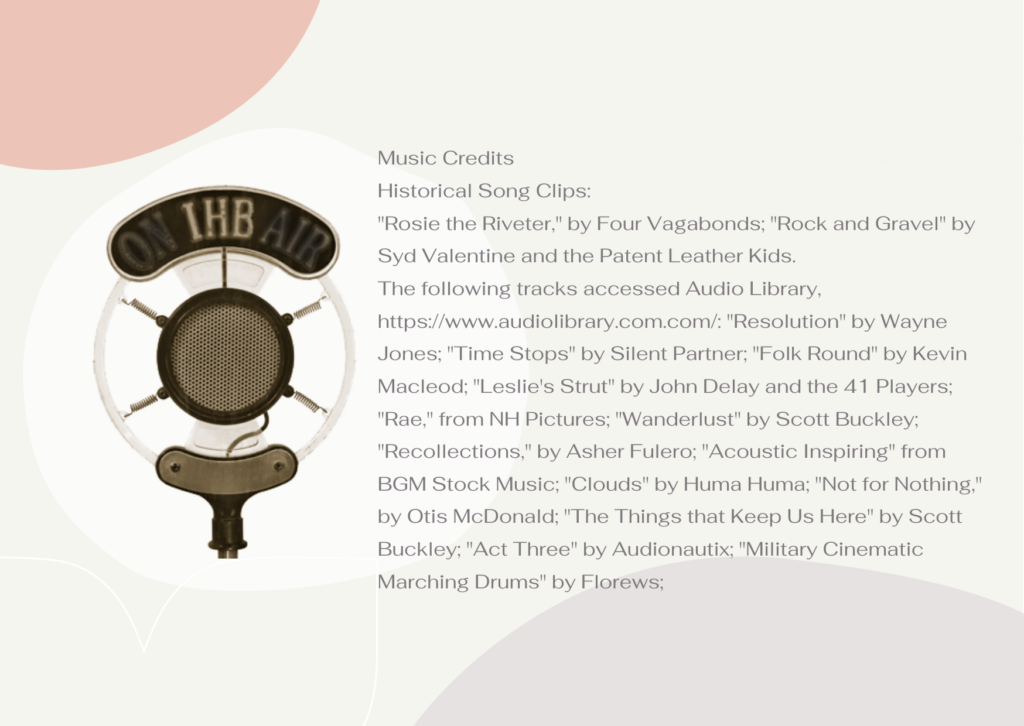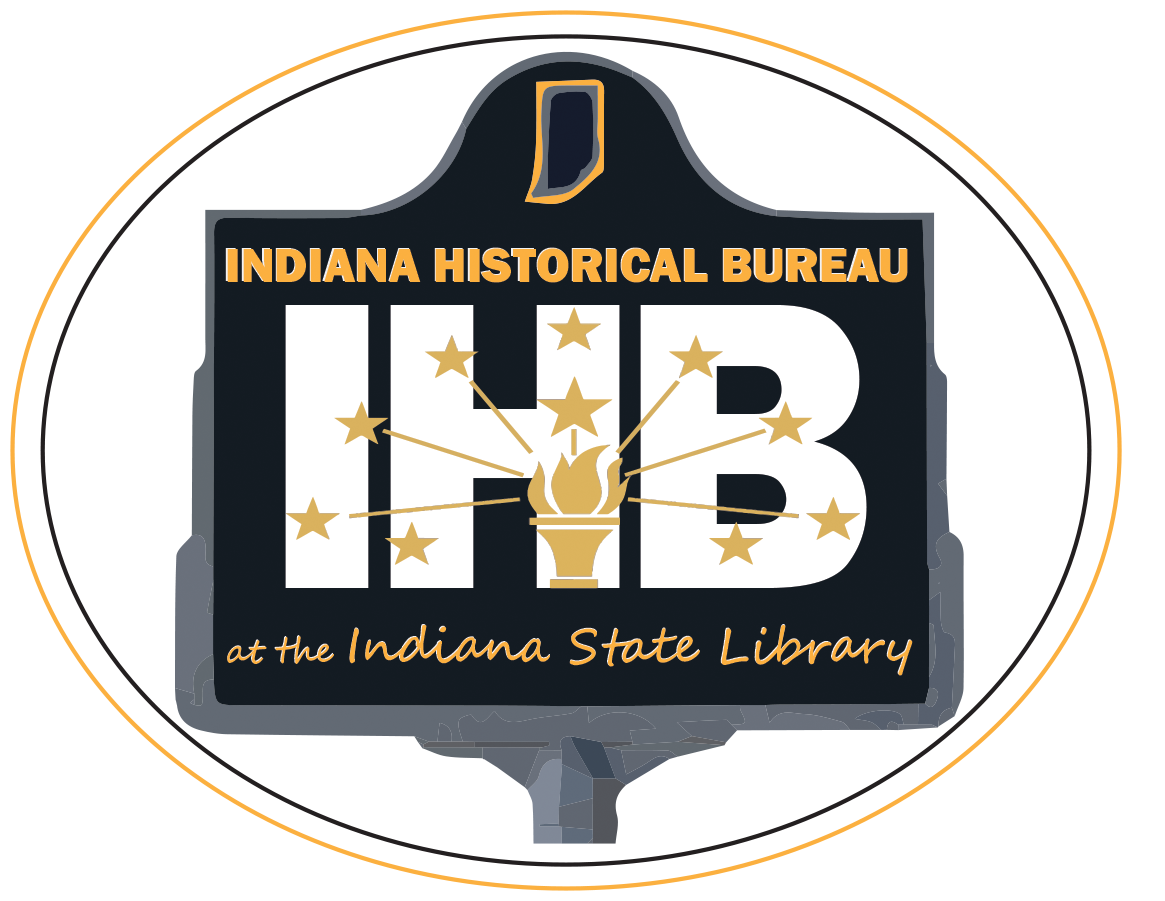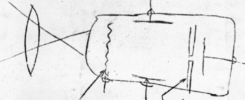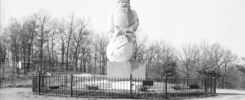Transcript for Petals, Not Pies: Queer Hoosiers Protest Anita Bryant
Adapted from research and articles by Nicole Poletika
Produced by Jill Weiss Simins
Bryant news clips: What they wanted to do was to flaunt it and not lose their jobs because of it . . . if we were going to go on a crusade across the nation to get rid of the homosexuals, then we certainly would have done . . .
Beckley: On October 14, 1977, gay rights activist Thom Higgins reserved his place in history when he threw a pie in the face of anti-gay crusader Anita Bryant during a Des Moines, Iowa press conference..
[Archival audio of incident]
Beckley: When Bryant made her way to Indiana less than two weeks later for a rally, gay activists welcomed her not with a pie in the face, but with Hoosier kindness – she was presented roses and invited to a reception in her honor. Today, we examine Hoosier’s reactions to Bryant’s appearances in the Hoosier state during the early years of the fight for gay rights.
[Protestors chanting]
Beckley: I’m Lindsey Beckley and this is Talking Hoosier History.
[Music]
Beckley: Dr. Martin Luther King, Jr. once said,
Martin Luther King, Jr.: The arc of the moral universe is long, but it bends towards justice.
Beckley: That arc is rarely smooth, though. It’s fraught with twists and turns, with forward progress followed by periods of setback. This push and pull can be seen throughout our history.
In the wake of the Civil War, during Reconstruction, newly free citizens actively participated in the political process. During that time, some 2,000 Black Americans held political office in the South. In fact, the first South Carolina Legislature elected after the 1867 Reconstruction Act was majority African American. Following Reconstruction, however, the backlash was harsh – Jim Crow laws placed nearly insurmountable hurdles in the way of Black voting rights and widespread racial violence and intimidation further quelled Black political power.
Between 1940 and 1945, 5 million women entered the workforce to aid in the war effort. Unlike before the war, they were employed in positions thought of as exclusive to men, like truck driving and aircraft repair. With the end of the war, society expected women to return to the home and more “traditional” positions. By the 1950s, women were expected to be in the home cooking, cleaning, and child rearing, and while this expectation wasn’t universally met, historians believe that it contributed to the baby boom of the 1950s.
[Funky music]
Beckley: And the 1960s and 70s were a time of great social change, and, as we’ve seen is often the case, great social pushback. Activists worked tirelessly for the passage of the Civil Rights Act while opponents resurrected the Ku Klux Klan, built monuments honoring Confederate generals, and championed the “lost cause” narrative of the Civil War. Meanwhile, the Equal Rights Amendment, or ERA which would have guaranteed equal legal rights for American citizens regardless of sex, was gaining widespread support. After being approved by both the U.S. House and Senate, it was well on its way to becoming law with 35 of the 38 states needed having ratified it, including Indiana. Then, in 1972, Phyllis Schlafly mobilized conservative women in protest. She argued that the amendment would strip women of the “special protections” afforded to them such as alimony and exemption from the military draft. The ERA remains unratified.
[Protests chanting]
Beckley: At the same time, queer Americans were making themselves more visible in society. The Stonewall Uprising of 1969, a watershed moment of the gay rights movement in the United States, fostered solidarity and encouraged further activism. In the wake of the uprising, activist groups such as the Gay Liberation Front formed. Unlike earlier gay organizations, such as the Mattachine Society and the Daughters of Bilitis, this new generation left no question as to what their identity and intentions were, from the inclusion of the word “gay” in their name to the language used in their manifesto:
Clark reading from manifesto: “The Gay Liberation Front is a militant coalition of radical and revolutionary homosexual men and women committed to fight the oppression of the homosexual as a minority group and to demand the right to the self-determination of our own bodies.”
Beckley: This increase in visibility and activism began producing change relatively quickly. On the first anniversary of the Stonewall Uprising, Gay Pride events were held in several cities across the country. In the five years following Stonewall, 15 states decriminalized same-sex intercourse. In 1974, Elaine Noble became the first openly queer person to be elected to state-wide office when she won her bid for a seat in the Pennsylvania House of Representatives. And by 1977, 40 cities throughout the US had passed ordinances banning discrimination in housing and employment opportunities based on sexual orientation.
Indiana experienced some of the same social progress. By 1973, there were two gay advocacy groups in Bloomington – the Bloomington Gay Alliance and the Gay Liberation Front. Same sex intercourse was decriminalized in 1975. There was a thriving gay bar scene in Indianapolis, with over a dozen bars around the city. And clubs like The Seahorse in South Bend provided gathering spaces for queer Hoosiers in other parts of the state.
However, unlike other places, Indiana did not pass non-discriminatory ordinances, and the queer community was largely relegated to dark bars and so-called “cruising” spots. And there was always the looming possibility of police raids. Randall King, who was in his 20s in 1970s Indianapolis, described his experience in an oral history interview with the Indianapolis Public Library’s Indianapolis LGBTQ+ Oral History Project:
King: Coming out in the 70s was a lot different than coming out today. In the 70s it was . . . if you were brave enough to go to the bars. If you were closeted you went to parks, you went to cruising areas, if you were out you went to bars. Bars got raided every weekend. I mean, it was a fact of life. There was always a cop in the parking lot taking down your license plate. I don’t know if they were really taking down this plate. That’s what everybody said, but there was always a cop there.
Beckley: What progress had been made was being threatened in 1977 when Greenwood legislator and evangelical preacher Don Boys introduced a bill in the Indiana House of Representatives that would have recriminilized of same-sex intercourse in the state. Boys made his views on the private lives of American citizens quite clear in an opinion piece published in the Franklin Daily Journal. He said that critic of the bill Attorney…
Clark reading from Journal: …Martha Michaels says that such anti-gay activity will only drive them underground. What she doesn’t understand is – that is where we want them . . . I said . . . that if you make perversion legitimate, perverts will come out of the closets and expect to be treated like normal people. They will be teaching in our schools, acting as big brothers, adopting children and marrying each other!
Beckley: This was not the first time Boys had introduced his anti-gay legislation – in 1976, the bill had received virtually no media coverage and had been quietly defeated in committee. But something happened in 1977 to bring Boys’ bill to the forefront of Hoosier politics. He brought pop singer, Florida Orange Juice spokesperson, and evangelical Christian Anita Bryant to the Circle City to lend her voice – literally – to the cause.
Anita Bryant archival clips: Natural orange juice is rich in vitamin c . . .it’s an obomination to practice homosexuality . . . so drink pure orange juice from Florida, you can buy it . . . my pastor said that he would do the same and even burn the school rather than allow them to be taught by homosexuals . . . come to the Florida sunshine tree . . . as long as they do their job and do not want to come out of the closet and force their homosexuality on me and the parents in the business and in the schools . . . remember, breakfast without orange juice is like a day without sunshine!
Beckley: Bryant had made headlines earlier in 1977 when she publicly opposed an ordinance in Dade County, Florida protecting the rights of queer residents.
Bryant archival clips: Just biologically, God made mothers so we could reproduce. Homosexuals can not reproduce biologically, but they have to reproduce by recruiting our children.
Beckley: Citing religious convictions and her belief that queer people would attempt to recruit children if allowed to hold positions in schools, Bryant rallied the evangelical community in protest of the Florida ordinance with her “Save Our Children” campaign.
Largely due to her efforts, the ordinance was overturned, but she wasn’t done with her campaign. She hit the road to help repeal similar ordinances in places like St. Paul, Minnesota, Wichita, Kansas, and Eugene, Oregon. In October 1977, she headed to Indianapolis for a “Rally for Decency” at the Indiana State Fairgrounds Coliseum.
[Music]
Beckley: Even before Bryant entered the Hoosier state, queer activists and allies began marshalling a defense. On the day before the rally was to take place, the Indiana Coalition for Human Rights hosted a news conference announcing that they would be picketing the performance because, they said,
Clark reading from statement: she represents a force for evil and persecution. She has inflamed irrational prejudices and fostered fear and hatred.
Beckley: Joining the picketers would be Baptist minister Rev. Jeanine C. Rae, who, according to IHB historian Nicole Poletika, believed that fundamentalists’ attempts to legislate sexuality threatened the separation of church and state and argued that withholding human rights from certain communities limits the freedoms of all Americans. Upon her arrival, Bryant hosted her own press conference at the Indianapolis International Airport, looking, in the words of journalist Robert Reed,
Clark reading from Reed: Very much like an aging but attractive president of the local PTA.
Beckley: She and her husband fielded questions about her work to repeal the Dade County ordinance, which she felt afforded gay individuals “special privileges” and would allow them to flaunt homosexuality in the classroom. She believed:
Marino reading Bryant: God put homosexuals in the same category as murderers, thieves and drunks. Homosexuality is a sin and I’m against all sin. I’m also against laws that give respectability and sanction to these types of individuals.
Beckley: Her remarks, which also included multiple plugs for her upcoming book and charges of a “nationwide homosexual conspiracy” against her, were not well received by the press, many of whom left before the end of the conference.
[Cheering crowd]
Beckley: That night, the Indiana State Fairgrounds Coliseum thrummed with cheers and “Amens” as approximately 7,000 attendees absorbed the words of speakers who outlined their plans to “restore decency” in America. The Martinsville Reporter-Times noted that the event “took on the aura of a political rally and a Baptist revival.” Local pastors emphasized the need to elect officials who supported causes like “Save Our Children,” some of whom sat in that very coliseum. Representative Boys advocated for his anti-sodomy bill, to be introduced later that year, and for lawmakers to expunge the Equal Rights Amendment.
After the speakers had had their turns, Bryant took the stage to perform in a white, flowing dress.
[Bryant singing Glory, Glory]
Beckley: The audience was rapt, hanging onto every word she sang. She occasionally punctuated her religious and patriotic songs with oration—like warning the audience that:
Marino reading Bryant: if parents don’t rise up and set standards for our children, the humanists, the ultra-liberals and the militant homosexuals will.
[Protestors chanting]
Beckley: Outside the coliseum, 500 protestors marched in the rain wielding signs saying, “Straights for gay rights” and “Anita Bryant – Molester of Human Rights” while chanting “Anita Bryant go away, human rights are here to stay.”
[Music]
Beckley: Protesters included Fritz Lieber, co-chairman of the Indiana Coalition for Human Rights, who lost his teaching position for being gay. While most of the protestors were young, Indianapolis resident Mary Hoffman, her husband, and three kids also attended the demonstration, believing that Bryant’s message “‘parallels McCarthyism, the Ku Klux Klan and Hitler.’” As protesters made their presence known, Rev. Jerry Falwell quipped on the stage:
Clark reading Falwell: It’s a shame it’s raining. It might wash off their make up.
Beckley: Although Bryant left the state following her performance, the anti-gay furor continued in her wake. The morning after the rally, 500 people gathered at Military Park in Indianapolis and marched the half mile to Monument Circle, where they joined 2,000 supporters for a “Save our Society” rally. Local pastor Earl Lawson, who worked to reform homosexual individuals and sex workers, declared that he would organize similar rallies across the state.
Some people in the queer community reported an increase in police harassment in the wake of Bryant’s visit. Ernest Rumbarger, a writer for local gay newsletter, The Works, wrote:
Clark reading from The Works: My partner and I were two of her better-known local victims. We were taken from our home in the middle of the night and held for eight days in jail, incommunicado.
Beckley: Despite being denied assistance from the Indiana Civil Liberties Union and the Gay People’s Union, a grand jury found Rumbarger not guilty and reportedly offered him an “unsolicited public apology.”
Along with sparking a wave of anti-gay activity in the state, Bryant’s visit acted as a catalyst for gay rights support from those outside of the community, who may never have considered the discrimination queer individuals endured on a daily basis.
Archival audio of protestors: The major effort today is to change the social institutions that make life difficult for us . . . if straight people can do all this carrying on, and holding hands, and kiss in the park, why can’t we do it?
Beckley: Gay activists and allies responded to the rallies through protest and press. Indianapolis newspapers printed an advertisement compiled by sixty-three clergy protesting the crusade. A few days after the rally, Indianapolis resident Jerry Briscoe wrote to the Indianapolis News editor that Bryant’s judgment of others “has become devastating to their existence” and contradicted Christian theology. He stated,
Clark reading from Briscoe: God is our ultimate judge—that is, of course, before Anita Bryant came along.
Beckley: When Bryant made a return visit to the state later that month, this time for a concert at the University of Notre Dame, Hoosiers were joined by Cleveland and Chicago activists to protest. The Michiana Human Rights Coalition formed ahead of her October 26th concert. Protesters planned to march with signs bearing Bible verses and Shakespearean quotes reaffirming human rights. That evening, only 500 of the arena’s 10,000 seats were occupied. The South Bend Tribune reported that Bryant, who led the scant audience in prayer for gay individuals, unwed couples living together, and divorced couples, “seemed lost in the vastness of the Athletic and Convocation Center.” The number of protesters, both in support of and opposition to Bryant, nearly matched that of concert-goers.
Although subjected to abuse from Bryants’ supporters, one of whom spat on the seven-year-old daughter of a Michiana Coalition leader, the protestors were determined to demonstrate kindness, even going so far as to invite Bryant to a reception in her honor and giving her a bouquet of roses.
Notre Dame employee Charles Early contested that the “fiasco” of a concert showed a growing acceptance of the marginalized community.
Three days later, Bryant performed one last time in the Hoosier state at the Embassy Theater in Fort Wayne, again with demonstrators picketing outside carrying signs reading “Gay is Okay” and “Anita Bryant is Proof Orange Juice Causes Brain Damage.”
In the following years, LBGTQ+ Hoosiers continued to seek visibility in ways that aligned with the “Hoosier Kind” attitude shown in their dealings with Anita Bryant. When meeting antipathy from the police in the midst of a string of homicides in the Indianapolis gay community in the 1980s, activists advocated for a solution. At a meeting with the Indianapolis Police Department, they made recommendations which would improve police relations with the queer community. After implementing some of these recommendations, progress, although intermittent, was made.
In 1984, in a show of solidarity against police harassment and surveillance, a series of gatherings was held on the steps of Monument Circle in downtown Indianapolis. Rather than a protest, these “Knights on the Circle” were meant to simply demonstrate the fact that queer Hoosiers existed and that they had the same rights as all Americans. The series culminated in a rally on August 31, 1984, with 600 gay and lesbian Hoosiers in attendance. In 1991 at the second ever large outdoor Pride event, religious protestors threatened members of the Indianapolis Men’s Chorus with baseball bats. Rather than meet violence with violence, choral director Michael Hayden instructed the men to sing the Star-Spangled Banner, a move which stopped the protestors in their tracks.
Hoosiers were not the only ones to protest a visit by Anita Bryant – she had a similar reception across the country. Gay bars around the nation boycotted the use of orange juice in their drinks, nixing the traditional Screwdriver and instead serving “Anita Bryant Cocktails,” made with apple juice and vodka. Partly in response to criticism of her anti-gay crusade and partly due to her recent public divorce and other personal hypocrisies, Bryant was dropped from endorsement deals and reportedly lost an estimated $500,000 in television contracts.
The anti-gay crusade led by Bryant was, in part, a reaction to societal changes. Backlash – whether it be to newly enfranchised Black Americans practicing their rights or to women working nontraditional jobs or queer individuals gaining visibility – often comes from a place of yearning for a “simpler time,” a more harmonious past when people were nicer and things were easier. But that past never really existed. A homogenous, unified America only existed in the imagination. Our nation has always been diverse – full of people from different backgrounds with different beliefs – it has just been a matter of people with privilege recognizing that. As social progress continues to evoke backlash, it’s important for us to recognize calls to return to a simpler time for what they are – calls to return to a time when fewer people shared in the American dream of freedom from discrimination.
Queer activist Barbara Gittings once said,
Weiss Simins reading from Gittings: Equality means more than passing laws. The struggle is really won in the hearts and minds of the community, where it really counts.
[Music]
Beckley: Once again, I’m Lindsey Beckley and this has been Talking Hoosier History. Talking Hoosier History is a product of the Indiana Historical Bureau, a Division of the Indiana State Library. This episode of was adapted from IHB historian Nicole Poletika’s Indiana History Blog post called The Debate Over “Decency:” How Hoosiers Challenged Anita Bryant’s Anti-Gay Rights Crusade. Sound engineering and production by Jill Weiss Simins. A special thank you to Indianapolis Central Public Library Special Collections Librarian Stephen Lane for providing access to their LGBTQ+ Oral History Project interviews and transcripts. A huge thank you to Justin Clark, Michella Marino, and Jill Weiss Simins for lending their voice to the podcast. You can find a full transcript and show notes for this episode by visiting Blog.history.in.gov and clicking Talking Hoosier History at the top. Find us on Facebook and Twitter as the Indiana Historical Bureau and remember to like, rate, and review Talking Hoosier History wherever you get your podcasts.
Thanks for listening!
Show Notes for Petals, Not Pies: Queer Hoosiers Protest Anita Bryant
Blog Posts
Poletika, Nicole, The Debate over “Decency:” How Hoosiers Challenged Anita Bryant’s Anti-Gay Rights Crusade, Indiana History Blog.
Oral History
Randall King, interview by Elise Schrader, October 16, 2020, virtual, Indianapolis Public Library’s Indianapolis LGBTQ+ Oral History Project.
Websites
Facing History and Ourselves, “The Reconstruction Era and the Fragility of Democracy.”
NYC LGBT Historic Sites Project, “Gay Liberation Front at Alternate U.”
PBS, “Women and Work After World War II.”
Music Notes



